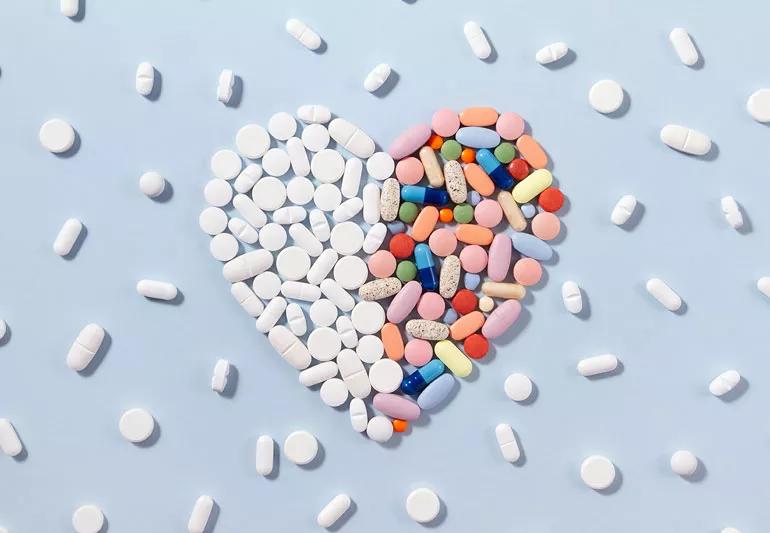
Physicians today have an arsenal of medications they can prescribe to help their patients in the battle against heart disease. If you are a heart patient, you can expect to be taking one or more of these highly effective medications.
Advertisement
Cleveland Clinic is a non-profit academic medical center. Advertising on our site helps support our mission. We do not endorse non-Cleveland Clinic products or services. Policy
As a heart patient, it’s important for you to understand what each medication does and how to use them safely, often in combination. When used appropriately and according to the proper prescription, these medications extend both quantity and quality of life by preventing heart attacks and strokes.
Modern heart drug therapy includes the following “big six” medications:
Statins were first introduced in 1987 and doctors now have seven different medications from which to choose depending on a patient’s need. They lower the “bad” LDL cholesterol levels by 20 to 60% and also reduce inflammation. Most people who have had a heart attack or stroke, bypass surgery, stents, or diabetes should be taking statins. Some patients with a high LDL level, but without heart disease, should also take statins.
Aspirin has been around for a long time and was first discovered to have cardiovascular benefits in the 1960s. Aspirin can help to keep your arteries open because of its anti-clotting and anti-platelet effects. A standard dosage for heart patients is 81 mg a day, which is one baby aspirin. Aspirin makes sense for people who already have heart disease, but not necessarily for people who just have risk factors.
Advertisement
But cardiologist Leslie Cho, MD, advises “we should emphasize that it’s really not recommended for primary prevention unless the ischemic benefit outweighs the bleeding risk.”
This drug is considered a “super-aspirin” because of its effectiveness in preventing platelet clumping, and it’s often used in combination with aspirin. For some patients there is an increased risk of bleeding and doctors will weigh the benefits versus the risks of this drug. However, if you have a stent, the combination of aspirin and clopidogrel is essential to preventing clotting. It’s also often used for patients with worsening angina.
Dr. Cho says if you’ve had acute coronary syndrome, a better option might be Ticagrelor or Prasugrel, however.
This drug is a stronger anti-clotting agent than aspirin and clopidogrel. It works as an anticoagulant – or blood thinner. Warfarin was widely used in the past to prevent the formation of clots if you have atrial fibrillation, an artificial heart valve or if you have blood clots in your legs.
Dr. Cho says now Warfarin is no longer the first line medication choice for afib or a blood clot in the leg or lungs. It’s primarily used for heart valve disease. And because it interacts with other medications and diet, it requires close monitoring by a physician.
“The first line drug for afib (depending on renal function) is novel oral anticoagulants,” she says.
Beta-blockers block the effects of adrenaline, which comes on in response to stressful situations. Beta-blockers are prescribed in the treatment of these four conditions:
Dosage of these medications must be adjusted for the desired response. Your doctor will monitor you for dizziness (due to low heart rate) kidney and liver problems.
ACE (angiotensin-converting enzyme) inhibitors prevent the body from producing the artery-constricting hormone angiotensin. Arteries relax with ACE inhibitors and this lowers blood pressure. They are prescribed for patients with congestive heart failure, a recent heart attack, and those with hypertension.
Collectively, these drugs save lives by preventing heart attacks and strokes. Chances are you will take one or more of these medications if you are at risk for or have coronary heart disease. Be sure to know your medications and follow your doctor’s instructions. You’ll want to work with them to get the safe and effective combination for you.
Advertisement
Learn more about our editorial process.
Advertisement

The little blue pill might help with physical arousal, but there are better treatments for low libido in women

Your body’s response to rapid weight loss from the medication may cause shedding

This medication is best used on a limited basis

Authorized take-back programs, services and drop-off locations are the best, safest way to get rid of expired medicine

These illegal supplements have negative impacts for vital organs and may cause psychosis, heart attacks and more

These creams that you apply to your skin can actually help reduce localized pain, swelling and inflammation

Popular among teens, these inhalants give you a quick high, with serious harmful effects

‘Black box warnings’ on medications outline potential risks and important instructions

Wearing a scarf, adjusting your outdoor activities and following your asthma treatment plan can help limit breathing problems

Your diet in the weeks, days and hours ahead of your race can power you to the finish line

When someone guilt trips you, they’re using emotionally manipulative behavior to try to get you to act a certain way